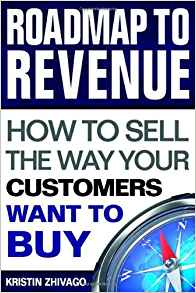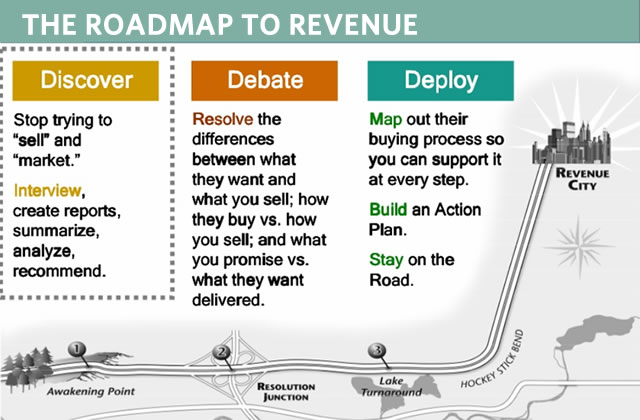
Revenue Coach Kristin Zhivago, wrote a new book, called “Roadmap to Revenue: How to Sell the Way Your Customers Want to Buy”.
She sent me a review copy and when starting to read it, I immediately realized that she is spot-on with her book that spares us from fancy marketing theories but clearly shows how to generate business by completely focusing on the way people buy.
Here are four absolute truths about buying and selling: 1) every sale starts with a buying or customer journey that is part of an overall customer life cycle, 2) we don’t know when the journey of a customer starts, 3) as businesses, we often don’t see many steps in it and 4) last but not least the journey is rarely linear or direct.
The buying journey and the truth about the shift from selling to buying
A buying journey can be fast or slow, and it can be very visible to us or hardly at all. However, it’s always there and is ultimately controlled by one person: the (future) customer.
He decides what, when, where and how he will buy. He decides how he will inform himself or seek advice when preparing a potential purchase. And he is in control.
No, this does not mean we don’t sell anymore. It doesn’t mean that buyers are sitting behind sophisticated dashboards with rational criteria and a well-developed path towards a purchase either. As a matter of fact, many people still like being sold to. And emotion is the key driver behind the way we buy, often following other roads depending on the product or the mood of the day.
Finally, the shift from selling to buying is strengthened by several phenomena such as an increase of information sources and interaction channels to inform ourselves.
However, people have always been in control of the buying process. A series of surveys I’m conducting right now shows it again: advice from peers is still a very important criterion in our buying journeys and recommendations still predominantly happen in face-to-face and telephone conversations, despite the growing role of online and social channels.
Sales depend on how people want to buy
Just as marketers should realize that the sun does not revolve around the earth (marketing campaigns, channels and tactics revolve around people, not the other way around), it’s time businesses realize the sale depends on the way people (want to) buy.
How people buy is changing. It’s obvious the way we sell should too (and we waited long enough).

In her book, Kristin Zhivago, exactly explains how the way people buy is changing but most of all, she explains how selling the way people want to buy is the solution, not selling the way WE want to sell. It’s people-centricity, sales, strategy, customer satisfaction, promises, lead generation and revenue generation in one book.
However, it’s not only for sales and management people. In fact, it’s also the kind of book every marketer should read to understand what really matters in this fragmented, multichannel and so-called connected world. It’s about people, what they want and how to make sure they get it, so we can create more revenue.
What does the customer want you to know and what’s your promise?
“The Road to Revenue” in a way reminds me a bit of another book every marketer should read: “What the Customer Wants You to Know: How Everybody Needs to Think Differently About Sales” by management guru Ram Charan, who understood what value chain selling is and how the old ways of solution-based selling and relationship sales don’t work.
We sell more than products: we sell promises (which we keep), depending on what our customers want and how they want it, we sell experiences, and we sell gratification and even success. Every good consultant knows that he succeeds when he realizes business objectives, the personal ambitions of the people he works with and the ambitions and needs of the customers or relations of his customers, etc. It takes some experience in a channel go-to-market model to realize that.
If you didn’t think about it like that yet: I just gave it away for free.
Back to Kristin’s book. As opposed to Ram’s book, Kristin refrains from stories and as opposed to many other business books, she refrains from big theories.
Talk, listen, decide, map, deploy, measure and improve
Her framework is clear, actionable and composed of several stages, each divided in several segments and action points.
A summary of some key takeaways in my own words:
- Talk to your prospects and customers to see what they need (and obviously listen). I’m not talking about social media monitoring or occasional meetings here, but about an actual plan whereby conversation reports are created that help you take decisions on facilitating the buy. It’s not only about “understanding” your customers. It’s also about “feeling” them. See the customer-centricity?
- Identify where the gaps are. Compare your goals, approach, way of working and strategy to what you actually discover about your customers and find an agreement, or better: a promise. That promise, along with the people who have to realize it and the people who buy it (also known as…customers) constitutes your brand. See the role of trust?
- Make lots and lots of maps. Build a buying process roadmap, define your revenue growth goals and map out how to get there, put up the processes, get the right people and deploy: be ready to facilitate the buy by structuring your promise in every touch point. See the conversion?
- Measure and improve. Yes, you know that but how often do you forget it? No sales or marketing book is worth that name if it doesn’t explain what you need to do to keep facilitating the buy, improving the experiences, increasing those revenues and most of all keeping the customer-centric or people-centric promise. See the analytics?
People are at the heart of business success
Kristin wrote “here’s to your rising revenues” in my copy. Although I haven’t entirely finished reading yet, I know that it will indeed help many business grow their revenue by simply applying the customer-centric steps and advice Kristin provides.
Any business book that questions the traditional ways of thinking and/or turns them upside down today, almost like Nietzsche wanted to question every moral and philosophical so-called “self-evidence” or like Jung investigated the unconscious complexity behind the rational and emotional “self-evidence”, should be on your list right now.
The sun really doesn’t revolve around the earth and people – among others your customers but not only them – really are at the heart of business success.
Kristin’s virtue is to present a roadmap on how to actually get there. You just need to be convinced.
Read more about her book on the micro-site or get it here on Amazon.


